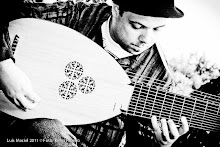 Edin Karamazov is a Bosnian lutenist (born in 1965 in Zenica). He studied with Hopkinson Smith at the Schola Cantorum Basiliensis and worked with various musical projects, soloists and groups, including Sting, Hespèrion XXI and Andreas Scholl.
Edin Karamazov is a Bosnian lutenist (born in 1965 in Zenica). He studied with Hopkinson Smith at the Schola Cantorum Basiliensis and worked with various musical projects, soloists and groups, including Sting, Hespèrion XXI and Andreas Scholl.Edin Karamazov stands out for its artistic and a wide-ranging approach, bringing to his archlute, works composed for other instruments, such as the "Nocturne" by Benjamin Britten and the “Partita in D Minor” by Johann Sebastian Bach. However, it was with his collaboration with the pop star Sting who gained wider projection, in the album "Songs from the Labyrinth" - Renaissance Music by John Dowland with the less erudite voice of Sting.
Edin Karamazov is now launching a solo CD for Decca, titled "The lute is a song." As in his previous recordings, the lutenist offers a differentiated approach on the traditional music for lute, taking the instrument out of the purist environments and embracing other musical genres, which in my view refreshes the entire landscape of lute music, sometimes criticized for being dull, thus keeping the instrument alive and interesting, while gaining more audiences.
"The lute is the song" includes music from the Renaissance to nowadays, classical but with a folk and pop touch, beginning with an unusual electric guitar music (Paisaje Cubano con rumba) by Leo Brouwer and including the participation of four of the most important voices of the world, Andreas Scholl, Renée Fleming, the Macedonian singer Kaliopi and Sting.
Among the songs chosen for the CD, is a fabulous interpretation of the famous “Toccata and Fuga in D minor” by Johann Sebastian Bach. Included is also a version of the Turkish Koyunbaba by Carlo Domeniconi in baroque lute and a Zamboni sonata for the more conservative public.
This is one of the best CDs I ever heard in my life and that will stir emotions in you, just listen to "Oh Lord, whose Mercies are numberless" by Händel with Edin Karamazov’s archlute and the incredible voice of the countertenor Andreas Scholl and you will receive the perfect absolution.
(português)
Edin Karamazov é um alaúdista bósnio (nascido em 1965 em Zenica). Estudou com Hopkinson Smith na Schola Cantorum Basiliensis e trabalhou com diversos projectos musicais, solistas e agrupamentos, incluindo Sting, Hespèrion XXI e Andreas Scholl.
Edin Karamazov destaca-se por sua abordagem artística bem mais abrangente, trazendo para o seu arquialaúde obras compostas para outros instrumentos, como são exemplos o “Nocturno” de Benjamin Britten e a partita em Ré Menor de Johann Sebastian Bach. No entanto, foi com a sua colaboração com a estrela pop Sting que ganhou bastante projeção, no álbum “Songs from the Labyrinth” – Música renascentista de John Dowland com a voz menos erudita de sting.
Edin Karamazov lança agora um CD solo pela DECCA, entitulado “The lute is a song”. Como no seu anterior registo discográfico, o alaúdista apresenta uma abordagem diferenciada sobre a tradicional música para alaúde, tirando o instrumento dos ambientes puristas e abraçando outros gêneros musicais, que no meu entender refresca toda a paisagem musical do alaúde, por vezes criticado de monótono, mantendo assim o instrumento vivo e interessante, enquanto conquista maiores audiências.
“The lute is a song” engloba música desde o Renascimento aos dias de hoje, clássico mas com um toque folk e pop, começando logo com uma invulgar música em guitarra elétrica (paisaje Cubano com rumba) de Leo Brouwer e incluindo a participação de quatro das mais importantes vozes do mundo, Andreas Scholl, Renée Fleming, a cantora macedônia Kaliopi e Sting.
Entre as músicas escolhidas para o CD, está uma fabulosa interpretação da famosa Toccata e Fuga em Ré menor de Johann Sebastian Bach. Incluídas estão também uma versão em alaúde barroco da Koyunbaba turca de Carlo Domeniconi e uma sonata de Zamboni para o público mais conservador.
Este é um dos melhores CDs que já ouvi na minha vida e que com certeza o irá emocionar, ouça “Oh Lord, whose mercies are numberless” de Händel com o arquialaúde de Edin Karamazov e a voz inacreditável do contratenor Andreas Scholl e receberá a perfeita absolvição.



No comments:
Post a Comment